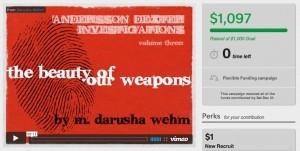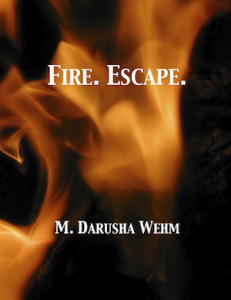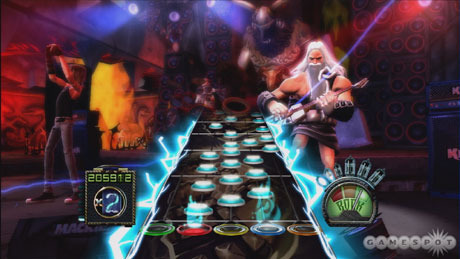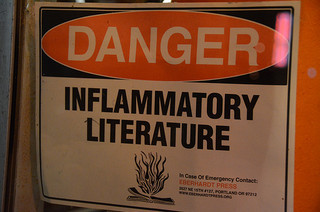M. Darusha Wehm's Blog, page 15
December 12, 2012
Mystery Writers and Fans Wanted
 As an adjunct to last week’s post, I’m on the hunt for folks who write short fiction in the mystery, detective, crime and thriller genres. I’m also looking for readers of same.
As an adjunct to last week’s post, I’m on the hunt for folks who write short fiction in the mystery, detective, crime and thriller genres. I’m also looking for readers of same.
I am working on a not secret but not yet officially announced project that I plan to launch in the New Year, and could use a little signal boost. If you know of a mystery writer or fan, please pass their name on to me or pass this post on to them. Feel free to hit me up on twitter, facebook or G+ with links to likely folks.
I thank you and I suspect they will, too.
December 5, 2012
One Trick Ponies

photo credit: tanakawho via photopin
Most people know me as a science fiction writer. That’s not terribly surprising, given that I’ve got four SF novels out, plus a bunch of SF stories in various markets. I’m active in conversations about SF in various online locales (Google+ is a hotbed of great discussion lately) and I’ve attended SF-themed conventions as a participant and speaker.
If the above isn’t a description of a science fiction writer, I don’t know what is.
But.
I’m not just a science fiction writer. Aside from the fact that I’m not just a writer, I write things that don’t even come close to being classified as SF. Not wanting to get into a “this is SF, this isn’t” argument, I definitely write outside my most recognizable genre.
I started writing seriously as a poet and I’ve had classic haiku published recently. I’ve got a mainstream novel cooking away in edits and I’m getting into straight-up mystery writing. That’s just what’s going on now – who knows what I might do in the future.
Plenty of writers don’t stick to a single genre, and there are certainly anecdotal stories of well-known writers being hamstrung by their readers’ (or editors’) desires to make sure they keep doing what they’ve always done, rather than what they want to do. Which is a shame.
Genre shouldn’t be a cage, whether gilded or rusty barbed-wire. As writers we need realize that one genre-based readership isn’t necessarily going to be interested in our work in other areas, but that should not stop us. Working in other genres is a way to create new readers, plus it keeps us excited about our work. A win-win.
So what do you write that’s not what you’re known for?
November 28, 2012
Crowdsourcing Funding for Novels

About a year ago I started planning to crowdsource funding the release of my upcoming novel. I’ll spoil the ending right now: I did it, and it was successful, raising just over $1000.
Recently, I’ve mentioned that I’m working on a couple of novels and I’ve been asked if I plan to crowdsource funding for their release, too. I hadn’t really thought about it (I’m not quite at that stage yet), but that made me think about the process for The Beauty of Our Weapons and whether or not I do want to give it another go.
As I’ve said, the previous campaign was financially successful. However, it was also stressful. Really stressful.
The campaign met its target on its last day, and it was met thanks to a very generous donor who chose one of the major packages that I’d included mostly for completeness. I was completely shocked first that the target had been met and doubly so by the generosity of this donor.
Though, nearly missing the target wasn’t the most stressful part of the process. I used an IndieGoGo campaign which allowed me to keep any funds raised regardless of whether I’d met the goal, and I’d structured the campaign in such a way that I had different things I could accomplish at different levels of success, so I was reasonably happy with the money aspect early on. What was much more stressful to me what the constant sense of nagging everyone I knew about it.
I am not a natural salesperson. Not even close. I find it kind of distasteful to ask for money under any circumstances, so promoting the campaign was really hard for me personally. I don’t know whether I did a good job or not; no one told me to stop talking about it, but people tend to be pretty polite about that sort of thing.
I did notice that almost all of the people who contributed were people who had previously supported my work. This wasn’t surprising, but it does make me wonder about the value of using this kind of method for the future, especially since I’d be tapping the same people over and over again.
So, I’m asking you: do you regularly use Kickstarter/IndieGoGo as a way to support the creative people whose work you like? Is that a method you prefer or would you rather just buy their thing once it’s commercially available? Do you like the aspect of many crowdsourcing projects where you can get limited edition or special physical products? If so, what kinds of things do you like to get?
And finally, if you are in favour of this method of funding, how would you suggest that campaigners share their news without being annoying? How do you like to be asked for money?
November 21, 2012
The Right Tool for the Job

photo credit: justinbaeder via photopin
There are two things you need to know about me for this story:
1. I am a creature of habit. I love schedules and plans, and have been known to turn down the opportunity to do something awesome because I’d scheduled something lame and totally unimportant for that time. More than once.
2. I used to be a real wrong-tool-for-the-job kind of person. I’d use whatever was handy for just about anything. I once built a set of patio furniture on my balcony with only a handsaw and electric drill. Nothing really wrong with that, except that my balcony wasn’t flat, I had neither a workbench nor a vice. At one point I used a stack of old CDs shoved under one end of a piece of wood to try and recreate a more or less 90° angle to attach the table legs. It sort of worked – good enough for me.
However, living on a cruising boat for several years has broken my attachment to both of these aspects of my character. They’re still there, but I can usually recognize when they have to go. When you’re at the mercy of the weather, plans are written in the sand at low tide. And using the wrong tool can ruin a lot more than your day. When the gale starts ablowing, you reef those sails.
So, I’m getting better at realizing that just becuae I’ve always done something a particular way doesn’t mean I have to keep doing it that way. Which brings me to why I abandoned Nanowrimo this year.
I’m an 8-time successful participant in Nanowrimo, and those writing bursts have all been useful. Several have turned into parts of now-completed novels and the couple of attempts which will never see the light of day in any format were extremely useful writing exercises from which I learned a lot. And so it was that I entered the ninth consecutive November where I anticipated getting down 50000 words of a long form project.
I started on Nov 1, as usual, and by the first weekend of November I was on track wordcount-wise. No problem, right? Except there was a massive problem. I was ruining my writing.
Unlike previous years, I now have a daily writing schedule that I’ve been keeping. It’s been working out really well for me, as I share my time between writing new fiction, editing works in progress and the inevitable administrivia of a self-employed writer. It’s a good schedule (I love schedules!) and it’s been making me crazy productive. Until I screwed it all up with Nanowrimo.
It was obvious that it wasn’t working for me, and when a tool stops being useful I’ve finally learned that you put it aside and get one that is. It was hard, though. The power of the unbroken streak, the call of the familiar – they are very hard for me to ignore. But it became clear that if I carried on with the Nano schedule, I’d be doing it only to have done Nano again. And what’s the point of that? I already know I can do it. I also already know I can write novels without the Nano machine behind me. So why was I doing it again?
No one knows.
So, I quit. The day I decided it was over, the project I’d been working on got better. My ideas crystalized and the writing improved considerably. I’d gotten back on to the writing schedule which was working for me – I’d picked up the correct tool.
November 18, 2012
New Stories in Audio
It dawned on me today that I haven’t yet posted here about a couple of my stories which were recently featured on a pair of quality podcasts.
“The Foreigner” was episode 43 of Toasted Cake and “The Care and Feeding of Mammalian Bipeds, v. 2.1″ is episode 370 of Escape Pod. Both are free to listen – go check them out!
November 14, 2012
Crowd Pricing – An Ebook Price Alternative
 How much should an ebook cost? This is one of those questions that is discussed endlessly among authors these days. “Price low and shift a bazillion units.” “99¢ devalues literature.” “I worked on this for five years; I can’t stand practically giving it away.” “All ebooks should be $4.99.”
How much should an ebook cost? This is one of those questions that is discussed endlessly among authors these days. “Price low and shift a bazillion units.” “99¢ devalues literature.” “I worked on this for five years; I can’t stand practically giving it away.” “All ebooks should be $4.99.”
To a certain extent, I think it’s a question with no answer. Everyone has their own top price they are willing to pay for a book, and not every book is going to have the same value to a potential buyer. Some people think paying under $10 for something is cheap enough to be an impulse buy, others hem and haw over paying a buck for anything. There is no right answer for everyone.
However, there’s a new model being proposed and I’ve decided to participate in the experiment. Scribl.com is a new ebook marketplace that uses a fluctuating pricing structure based on popularity. The idea is that by charting popularity of downloads, they can prove what the market will bear.
On Scribl, all ebooks start at free. As more people download the free version, the price moves up a tier. The more downloads at any price, the higher the price becomes.
The idea is that the market will bear a higher price for more popular books and that, as a reader, you know that if a book is priced at $6.99, that’s because a lot of people have already purchased it.
 I’ve put Beautiful Red and a new novella (maybe more of a novelette, really) called Fire. Escape. on Scribl. For now, they are both free, so if you want to get an ebook copy of either or both, head over to Scribl soon.
I’ve put Beautiful Red and a new novella (maybe more of a novelette, really) called Fire. Escape. on Scribl. For now, they are both free, so if you want to get an ebook copy of either or both, head over to Scribl soon.
Disclaimer: This is an experiment for me. I don’t believe there is a correlation between quality and popularity, so being able to judge a book by its price isn’t something I buy at all. However, the current state of the art in ebook pricing is out to lunch, so I welcome people who are trying to innovate in this space, and want to support the attempt. If this interests you, go check it out.
November 7, 2012
A Kind Word – The Value of Encouragement

via DIYLOL.com
“Even a cat appreciates kind words.” – Russian proverb
Recently I had the singular pleasure of receiving a note from someone I’d briefly conversed with years ago in another internet life. The note began “Are you the Darusha Wehm who…”
This always makes me smile, as if there are a zillion Darusha Wehms out there (there aren’t), though I understand that people want to make sure they have the right person for these things.
Anyhow, the note was to thank me for some kind words I’d sent to this person, probably five years ago. At that time, I’d read something this person wrote, loved it, and said so. That was all. That simple act of telling someone that I liked their work was enough to resonate in their mind all this time and encourage them to continue.
I often forget about the totally disproportionate effect that encouragement can have, especially to creative endeavours. It can be a lonely existence, making new things. The self-doubt is always there, at least it is for me. every time I start something, there’s this evil little voice in my head that says, “This is stupid and you’re stupid for doing it.” But, thankfully, I also have all the other voices of encouragement I’ve heard over the years and they drown that fucker out.
It takes so little effort to tell someone you like what they do but it has such a powerful impact. When that nasty little voice is taking a deep breath and getting ready to do its thing, those thirty seconds to send a tweet or an email or leave a comment saying “hey, I think your thing is really great,” can make the difference between listening to the voice and giving up or telling it to shut it and getting back to work.
And don’t forget the self-serving angle: when you encourage people to keep making things you like, they make more things for you to like. It’s a win-win!
October 31, 2012
In Between Times

image mashup from originals by fairlybuoyant
As I write this I’m in one of those strange writing places. As a fairly accomplished procrastinator, I usually have between one and a hundred writing projects on the go in some form or another. Typically there’s a novel being edited, a short story being written and a couple of other things in various states of action.
At the moment, though, I’m kind of in between everything. I have a novel at my alpha reader, another that I’ve put aside in the editing process to simmer, a short story with beta readers and I’m prepping a novel. Okay, so that last one is something to actively work on, but overall I feel kind of like I’m out of work.
I know that as a self-directed writer, this situation is entirely up to me. I could start pounding away on one of those story ideas cluttering up my notebook, I could skip the simmer and get editing that novel, or I could just declare myself to be on holiday, spend my days playing Guitar Hero and finally finish Metallica’s One on hard (it’s just those meedlies at the end — I’m so close I can taste it!).
I’ll pick one of those options soon enough, but for now I’m kind of enjoying the somewhat weightless feeling of being in between projects. I haven’t had it for a long time and it’s interesting. Doubtlessly, something productive will come of it.

image via Gamespot.com
October 24, 2012
Where is the Serious SF?

photo credit: MythicSeabass via photopin
I read this article, Cowardice, Laziness and Irony: How Science Fiction Lost the Future by Jonathan McCalmont (found via Ian Sales) a few weeks back and have been mulling over what to say about it. It is long… very long and somewhat inflammatory. I am fairly certain that a lot of SFF writers would get pretty angry at what McCalmont has to say here.
That said, I think anyone writing seriously in SFF should read the whole piece and think about the issues it raises. McCalmont has strong opinions about what is wrong with SF today. I know that many people don’t think anything is wrong with SF today and my intention is not to argue that point. However, this article talks about a perceived sense of disaffection and irony in mainstream SFF nowadays.
I’m drawn to articles like this for two reasons: one) I want to write better, more serious, more complex SF and two) I personally find that, as a reader, I’m disappointed that the kinds of stories I like aren’t being published and critically lauded that often these days.
I say that item two is a matter of personal preference, but McCalmont argues that it’s a result of current SF’s “exhaustion” – essentially that writing about the world as it is through the lens of the world as it could be is just plain difficult, which is why it isn’t being done very often.
His first point is a refutation that writing about a plausible future is impossible because that future is already here.
The most common account of why science fiction no longer attempts to engage with the future is that the future is now deemed to be out of bounds. The world, we are told, changes so quickly that any attempt to predict the future would necessarily be out of date by the time the book was released.
I agree with McCalmont that this is a total cop-out. Sure, writing about any near-future that is based on the current state of the art is tempting the fate of having one’s “predictions” come true or be invalidated. But, so what? It’s fiction and its purpose is, at least ideally, to shine a mirror on the world in which we do live. Part of that world is rapid change, new technologies and obsolescence Coming up with future-proof stories shouldn’t be the goal.
McCalmont then takes umbrage with the blurring of genre lines. Here, I am in two minds – as I’ve argued earlier, genre to me seems to be a bit of an artificial construction. That said, I did feel a stirring of agreement at this complaint:
The most obvious manifestation of science fiction’s exhaustion with the future has been an intentional blurring of the line between that which was traditionally thought of as science fiction and that which was traditionally thought of as fantasy. As Kincaid puts it, this “is a notion that has clearly taken root with today’s writers since they consistently appropriate the attire of fantasy for what is ostensibly far-future sf, even to the extent of referring unironically to wizards and spells and the like.”
(The article he’s referring to here is Paul Kincaid’s critique of Year’s Best anthologies – another worthwhile read on this subject.)
I think that the problem isn’t so much the lack of strong genre identity as it is a lack of seriousness of purpose to the storytelling. I think McCalmont is wrong when he argues that one leads to the other:
…in order to produce such a story, a writer must reach the conclusion that genre boundaries and expectations are things unworthy of being taken seriously. The problem is that, once writers began treating genre boundaries with a degree of ironic detachment, they found it rather difficult to be serious about anything at all.
I don’t see the inherent connection there. Denying the validity of strong genre lines does not require the denial of other serious content. McCalmont even goes on to talk about genre-blurring books with strong socio-political aspects.
(I suspect that McCalmont is, like me, generally turned off as a reader as soon as supernatural elements appear. However, fantastic elements can be used in a rigourous, serious story. Zoo City by Lauren Beukes is a fine example.)
Ultimately it is that lack of seriousness that is the crux of McCalmont’s (and my) complaint. There is certainly a market for escapist fiction, and there’s nothing wrong with writing it or reading it. But there is something wrong with it being the only work that is available or lauded. And escapism does have the (I hope) unintended consequence of letting us forget the real consequences of actions. Just as death is merely an inconvenience in a video game, there are no real political and economic consequences of fictional societies that hand-wave away where all that fun stuff comes from.
While the idea of an escapist fantasy that allows middle-class white people to escape their historical responsibility is about as politically dubious as contemporary science fiction gets, the fundamental mechanics of the Nostalgic approach to science fiction are largely value free as they are principally about building a fictional past that fits with how people feel about the present.
and
In contemporary science fiction, the traditionally disenfranchised are encouraged to write as long as their stories do not remind us of the historical inequalities that marginalised these writers in the first place.
For me as a writer, it is a constant challenge to create a universe which is plausible within the constraints of physics and the current technological state of the art, yet ”other” enough to be a vehicle to comment on some aspect of the current human condition. What draws me to SF is the ability to use a what-if scenario to examine contemporary issues in an entertaining rather than didactic way.
It’s a careful balance between pure escapism and political screed, and it’s not easy to strike that balance the right way every time. I know I fail and I’ve read writers much better than me who fail, too. But we still ought to try.
The challenge facing contemporary science fiction is to widen the cracks and to peer through the fractured veneer of neoliberalism in an effort to see what could one day come to pass. These futures, though speculative, must always remain anchored in the present moment as the real challenge facing science fiction is not merely to create a possible future, but to create the type of possible future that is currently deemed unthinkable.
…
We are living in a science fictional world and this means that science fiction is in a unique position to help us to make sense of a dangerously unstable world. By rediscovering its ties to reality and using old tropes to explore new problems, science fiction can provide humanity with its first draft of future history.
October 17, 2012
Procrastination Pumpkin

photo credit: Darwin Bell via photopin
A couple of weeks ago I had a writing breakthrough and it’s all because of a magic pumpkin. This is its story.
(By “magic”, I mean merely special by dint of being used in service of solving a non-pumpkin problem. It wasn’t really magic. Magic isn’t real.)
I had been working on cobbling together the first real draft of a novel I’ve been fighting with on and off for about five years. I’ve descibed it before as wrestling with a kraken – as soon as I got a grip on one part of it, another would rear up out of the vast depths to smack me upside the head. It was, needless to say, a procrastinator’s dream.
I’d been diligently hacking away at the tentacles for a few weeks; forcing myself to face the beast each day, even if it were only for a few minutes. I was getting somewhere, but not fast. The end was not in sight.
Then one day, on a completely unrelated mission, I bought a big pumpkin. I like pumpkin a lot, particularly in baking, and here in New Zealand they don’t sell pureed pumpkin in a can like they do in North America. They sell actual pumpkins. So, hankering for pumpkin spice goodness (and having promised my friend a pumpkin birthday cake), I had to chop and cook and puree this bad boy.
Now, I like to cook and baking is okay, but I hate food prep. Chopping vegetables is boring, annoying work and trying to get into a pumpkin isn’t torture but it sure does suck. But here I was. This pumpkin wasn’t going to chop itself into pieces. Whatcha gonna do?
So there I was, staring at this pumpkin, and it’s just sitting there like a gourd. I did not want to chop up this pumpkin. In fact, I wanted specifically to not chop up this pumpkin. No problem. I’m a good proctastinator. So I just openend up that file with the kraken in it, which looked a hell of a lot better compared to this pumpkin. And a hour later that kraken was nothing more than calamari fixins.
By then I was so high on achievement that dealing with the pumpkin seemed like no big deal, either. And the cake that it turned into was awesome.
So take that pumpkin-krakens.

photo by astrobri



